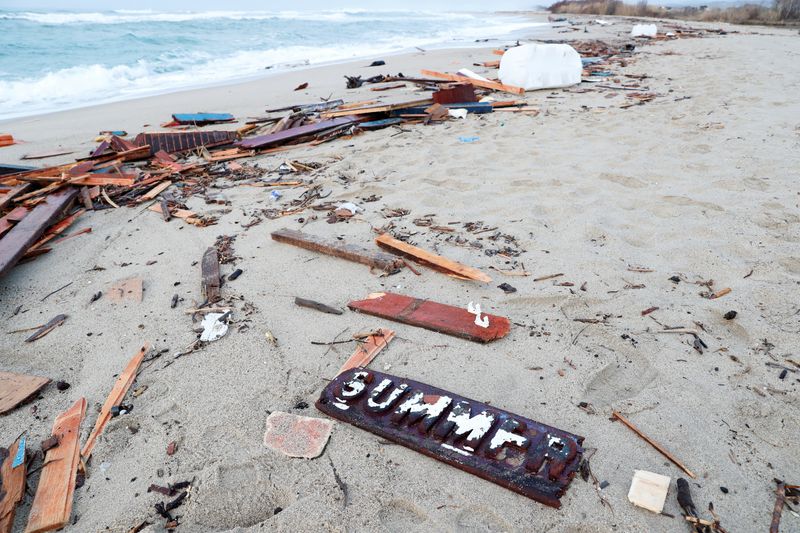By Angelo Amante
STECCATO DI CUTRO, Italy (Reuters) - Five days after leaving Turkey, migrants crammed in darkness aboard a wooden sailboat pleaded with their traffickers to radio for help as they rocked in increasingly stormy seas off Italy.
The people smugglers reassured them they were safe, holding up an iPad to show how close they were to the shore and saying they wanted to land on the southern toe of Italy in the dead of night to avoid police patrols and certain arrest.
Their confidence was misplaced. Hours later, the boat, named "Summer Love", smashed apart on rocks within sight of the village of Steccato di Cutro, killing at least 72 of the estimated 180 migrants aboard.
Unbeknownst to them, a plane from the European Union's Frontex border mission had spotted the vessel around 5-1/2 hours earlier and signalled to Italian authorities that it could be carrying migrants below deck.
However, two police boats sent out to intercept the vessel failed to locate it and turned back because of bad weather. Larger coastguard boats, better suited to search and rescue operations, were not called on.
The disaster has cast a spotlight on ruthless smugglers who are increasingly using Turkey as a launch pad for voyages to Italy. It has also raised questions about why the Italian authorities failed to prevent one of the worst shipwrecks in the country's recent history.
Prime Minister Giorgia Meloni, who takes a hard line on immigration, has dismissed suggestions that more could have been done, saying Frontex did not warn that the boat was at risk of sinking.
"No emergency communication from Frontex reached our authorities," she said last week. Frontex said it was up to local officials to decide how to respond to its sightings.
Reuters spoke to relatives of victims and officials involved in the investigation, and reviewed survivors' accounts of the deadly voyage. They revealed the efforts made by the traffickers to avoid detection in a boat not fit for purpose. They also show how authorities on land failed to grasp the danger at hand.
SUSPICIONS IGNORED
The migrants, including Afghans, Pakistanis, Iranians and Syrians, set sail from a secluded Turkish bay on Feb. 22, paying 8,000 euros each for safe passage. After barely three hours, their yacht broke down and they eventually transferred onto an old wooden 'caicco'.
"It was dilapidated and didn't have any seats.... there were pools of oil on the floor," one of the migrants told police, according to a transcript seen by Reuters.
Frontex said one of its planes that regularly patrol the Mediterranean spotted the boat 40 miles from the coast of Italy at 10.26 p.m. (2126 GMT) on Saturday as the weather deteriorated.
"There were no signs of distress," the agency said in a statement, adding that it nonetheless raised suspicions because the plane's thermal imaging showed there might be people below deck -- an indication it could be smuggling migrants.
Frontex informed a coordination centre housed in a building used by the Guardia di Finanza (GdF) customs police near Rome. Italian officials sent two GdF patrol boats to investigate rather than order a rescue operation.
An official with knowledge of the mission, who declined to be named, said the GdF boats were unable to reach the 'Summer Love' due to rough seas and rebased at around 3.40 a.m.
Police were not sure if they were dealing with migrants or possible drug or cigarette smugglers, the official said.
Retired coastguard Admiral Vittorio Alessandro told Reuters the authorities were less likely to order a rescue mission for migrant boats than for registered vessels.
"If we are dealing with boats that do not involve migrants then precaution takes precedence," he said.
Hundreds of thousands of migrants have reached Italy by boat over the past decade, fleeing conflict and poverty back home. Meloni's government has vowed to crack down on arrivals, but has denied any suggestion it delayed a rescue operation.
"Is there anyone in this country who really believes that the government deliberately let more than 60 people die, including children?" Meloni said at the weekend.
TRAGEDY UNFOLDS
Survivors told investigators the traffickers changed direction in the early hours of Sunday, fearing there were police nearby. They hit the rocks at around 4.00 a.m.
Nobody aboard issued a distress call. Two migrants told police that the traffickers were equipped with a device for jamming telephone calls to prevent communication that could give away their location.
The first indication that a tragedy was unfolding came from three fishermen on the shore, who saw the boat smash apart. The first police car arrived on the scene at 4.30 a.m. and officers immediately looked to save those struggling to reach land.
Many of those aboard could not swim. So far, the bodies of 28 minors and 30 women have been recovered. Seventy-nine people survived and around 30 are still missing, believed dead.
Crotone chief prosecutor Giuseppe Capoccia has launched two investigations — one into the traffickers and another into whether enough was done to avoid the tragedy.
He told Reuters it was vital for the government to bolster security forces in the area to deal with arrivals from Turkey, which last year numbered as many as five a week.
"Rescue and law enforcement structures here are those of a small town. We face a phenomenon that probably overwhelms us even as a nation," he said.
Rome last month passed new tough rules on sea rescues on the back of surging arrivals -- the latest in a string of measures taken over the past seven years to try to deter migrants.
Lawyer and human rights expert Fulvio Vassallo Paleologo told Reuters the cumulative effect of these initiatives was to limit rescues in international waters.
He said the coastguard had to coordinate with the interior ministry, slowing its response time.

However, Interior Minister Matteo Piantedosi told parliament on Tuesday that human smugglers were entirely to blame.
"Claiming that the government conditioned or prevented a rescue is a grievous falsehood," he said.